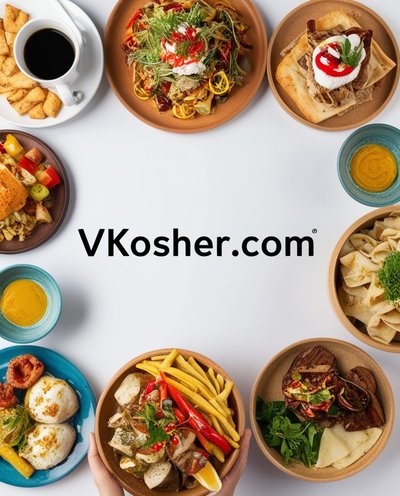Understanding Kosher Garlic: A Comprehensive Guide
Garlic is a staple ingredient in kitchens around the world, cherished for its robust flavor and numerous health benefits. However, when it comes to kosher dietary laws, garlic takes on an additional layer of significance. For those who observe kosher dietary practices, it is essential to ensure that garlic meets specific criteria before it can be considered kosher. This article delves into the intricacies of kosher garlic, exploring what makes garlic kosher, how it is produced, and why it is an essential component of a kosher diet.
What Makes Garlic Kosher?
Kosher is a term that originates from the Hebrew word "kashér," meaning fit or proper. When applied to food, it refers to products that comply with Jewish dietary laws known as kashrut. For garlic to be considered kosher, it must adhere to these strict guidelines throughout the entire process of cultivation, harvesting, processing, and packaging.
The most fundamental aspect of kosher garlic is ensuring that it is free from contamination by non-kosher substances. This means that the garlic must be grown, harvested, and processed in facilities that do not come into contact with non-kosher food products or utensils. Additionally, kosher certification authorities must inspect the garlic at various stages to ensure compliance with kosher laws.
The Production Process of Kosher Garlic
The journey of garlic from the farm to the table is an intricate one, especially when kosher certification is involved. The production process of kosher garlic begins with the selection of seeds. The seeds used must be certified kosher and free from any contamination by non-kosher elements. Farmers who cultivate kosher garlic often work closely with rabbis or kosher certification agencies to ensure that every step of the growing process adheres to kosher laws.
Once the garlic is harvested, it is transported to processing facilities that have been certified as kosher. These facilities are strictly monitored to prevent any cross-contamination with non-kosher substances. The garlic is cleaned, sorted, and sometimes peeled in these facilities, all under the watchful eye of kosher certification authorities.
One of the critical aspects of kosher garlic production is ensuring that the equipment used in the processing is exclusively for kosher products. This includes machines used for peeling, slicing, and packaging the garlic. The equipment must undergo a rigorous cleaning and kosherization process before it can be used for kosher garlic. Kosherization typically involves thorough cleaning, followed by the application of boiling water or other koshering agents to remove any residual non-kosher substances.
Kosher Certification: Ensuring Compliance
For garlic to be sold as kosher, it must bear a kosher certification symbol on its packaging. This symbol is issued by a recognized kosher certification agency after the garlic has passed all necessary inspections and meets the requirements of kashrut. The certification process is meticulous and involves regular inspections of the farming, processing, and packaging facilities.
The kosher certification symbol provides assurance to consumers that the garlic they are purchasing complies with kosher dietary laws. There are several kosher certification agencies worldwide, each with its symbol. Some of the most recognized kosher certification symbols include OU (Orthodox Union), OK (Organized Kashrut Laboratories), and Kof-K.
It is important to note that not all garlic is automatically considered kosher. Even though garlic is a plant and inherently kosher, the processes involved in its production and packaging can introduce non-kosher elements. This is why kosher certification is crucial for those who observe kosher dietary laws.
The Role of Kosher Garlic in Jewish Cuisine
Garlic is a fundamental ingredient in Jewish cuisine, contributing flavor and depth to various traditional dishes. In Jewish culinary traditions, garlic is used in everything from challah bread and gefilte fish to brisket and matzo ball soup. The pungent aroma and rich flavor of garlic enhance the taste of these dishes, making it an indispensable ingredient in kosher cooking.
One of the most iconic uses of garlic in Jewish cuisine is in the preparation of schug, a spicy Yemenite condiment made from crushed garlic, chili peppers, and spices. Schug is often served alongside falafel, hummus, and other Middle Eastern dishes, adding a fiery kick to the meal.
Garlic is also a key ingredient in many kosher pickles, where it imparts a robust flavor that complements the tanginess of the pickling brine. In Ashkenazi Jewish cuisine, garlic is frequently used in the preparation of traditional soups, such as borscht and chicken soup, where it adds a comforting depth of flavor.
Health Benefits of Kosher Garlic
Beyond its culinary uses, garlic is renowned for its numerous health benefits. For centuries, garlic has been used in traditional medicine for its therapeutic properties. Modern scientific research has confirmed many of these benefits, making garlic a popular supplement for promoting overall health.
Garlic is rich in allicin, a sulfur compound that is responsible for its distinctive smell and many of its health benefits. Allicin has been shown to have potent antibacterial, antiviral, and antifungal properties, making garlic a natural remedy for various infections. Additionally, garlic is known to boost the immune system, reduce inflammation, and lower blood pressure.
For those who observe kosher dietary laws, incorporating kosher garlic into their diet is not only a way to comply with religious practices but also a means of promoting good health. Whether used fresh, cooked, or in supplement form, kosher garlic offers a wide range of health benefits that align with the principles of holistic wellness.
The Global Market for Kosher Garlic
The demand for kosher garlic has been steadily increasing, driven by the growing global interest in kosher foods. While kosher garlic is particularly popular among Jewish communities, it is also sought after by consumers who appreciate the rigorous standards of kosher certification. The global market for kosher garlic includes a variety of products, from fresh bulbs to minced garlic, garlic powder, and even garlic-infused oils.
One of the key factors contributing to the growth of the kosher garlic market is the perception of kosher foods as being of higher quality and purity. Consumers who may not necessarily observe kosher dietary laws often choose kosher products because they trust the thoroughness of the certification process. This has led to an expansion of kosher garlic products in mainstream supermarkets and specialty food stores.
In addition to traditional forms of garlic, there is also a growing market for organic kosher garlic. Organic farming practices align well with the principles of kashrut, as both emphasize purity and sustainability. Organic kosher garlic is produced without the use of synthetic pesticides, herbicides, or fertilizers, making it an attractive option for health-conscious consumers.
Challenges in Kosher Garlic Production
While the market for kosher garlic is thriving, producers face several challenges in maintaining kosher certification. One of the primary challenges is the need for constant vigilance to prevent contamination. Since kosher garlic must be free from any contact with non-kosher substances, producers must implement strict controls at every stage of the production process.
Another challenge is the cost associated with kosher certification. Obtaining and maintaining kosher certification can be expensive, as it requires regular inspections, specialized equipment, and adherence to stringent guidelines. These costs are often passed on to consumers, making kosher garlic more expensive than its non-kosher counterparts.
Despite these challenges, many producers are committed to providing kosher garlic to meet the needs of their customers. The demand for kosher products, including garlic, continues to grow, and producers recognize the importance of maintaining the integrity of their kosher certification.
Conclusion: The Significance of Kosher Garlic
Kosher garlic is more than just a food product; it represents a commitment to religious observance, quality, and health. For those who adhere to kosher dietary laws, kosher garlic ensures that their meals are prepared in accordance with their beliefs. The rigorous standards of kosher certification provide consumers with confidence in the purity and integrity of the garlic they consume.
As the global demand for kosher products continues to rise, kosher garlic remains a vital ingredient in Jewish cuisine and beyond. Whether used to enhance the flavor of traditional dishes or to promote overall health, kosher garlic is a symbol of the intersection between faith, culture, and wellness.
Garlic is a staple ingredient in kitchens around the world, cherished for its robust flavor and numerous health benefits. However, when it comes to kosher dietary laws, garlic takes on an additional layer of significance. For those who observe kosher dietary practices, it is essential to ensure that garlic meets specific criteria before it can be considered kosher. This article delves into the intricacies of kosher garlic, exploring what makes garlic kosher, how it is produced, and why it is an essential component of a kosher diet.
What Makes Garlic Kosher?
Kosher is a term that originates from the Hebrew word "kashér," meaning fit or proper. When applied to food, it refers to products that comply with Jewish dietary laws known as kashrut. For garlic to be considered kosher, it must adhere to these strict guidelines throughout the entire process of cultivation, harvesting, processing, and packaging.
The most fundamental aspect of kosher garlic is ensuring that it is free from contamination by non-kosher substances. This means that the garlic must be grown, harvested, and processed in facilities that do not come into contact with non-kosher food products or utensils. Additionally, kosher certification authorities must inspect the garlic at various stages to ensure compliance with kosher laws.
The Production Process of Kosher Garlic
The journey of garlic from the farm to the table is an intricate one, especially when kosher certification is involved. The production process of kosher garlic begins with the selection of seeds. The seeds used must be certified kosher and free from any contamination by non-kosher elements. Farmers who cultivate kosher garlic often work closely with rabbis or kosher certification agencies to ensure that every step of the growing process adheres to kosher laws.
Once the garlic is harvested, it is transported to processing facilities that have been certified as kosher. These facilities are strictly monitored to prevent any cross-contamination with non-kosher substances. The garlic is cleaned, sorted, and sometimes peeled in these facilities, all under the watchful eye of kosher certification authorities.
One of the critical aspects of kosher garlic production is ensuring that the equipment used in the processing is exclusively for kosher products. This includes machines used for peeling, slicing, and packaging the garlic. The equipment must undergo a rigorous cleaning and kosherization process before it can be used for kosher garlic. Kosherization typically involves thorough cleaning, followed by the application of boiling water or other koshering agents to remove any residual non-kosher substances.
Kosher Certification: Ensuring Compliance
For garlic to be sold as kosher, it must bear a kosher certification symbol on its packaging. This symbol is issued by a recognized kosher certification agency after the garlic has passed all necessary inspections and meets the requirements of kashrut. The certification process is meticulous and involves regular inspections of the farming, processing, and packaging facilities.
The kosher certification symbol provides assurance to consumers that the garlic they are purchasing complies with kosher dietary laws. There are several kosher certification agencies worldwide, each with its symbol. Some of the most recognized kosher certification symbols include OU (Orthodox Union), OK (Organized Kashrut Laboratories), and Kof-K.
It is important to note that not all garlic is automatically considered kosher. Even though garlic is a plant and inherently kosher, the processes involved in its production and packaging can introduce non-kosher elements. This is why kosher certification is crucial for those who observe kosher dietary laws.
The Role of Kosher Garlic in Jewish Cuisine
Garlic is a fundamental ingredient in Jewish cuisine, contributing flavor and depth to various traditional dishes. In Jewish culinary traditions, garlic is used in everything from challah bread and gefilte fish to brisket and matzo ball soup. The pungent aroma and rich flavor of garlic enhance the taste of these dishes, making it an indispensable ingredient in kosher cooking.
One of the most iconic uses of garlic in Jewish cuisine is in the preparation of schug, a spicy Yemenite condiment made from crushed garlic, chili peppers, and spices. Schug is often served alongside falafel, hummus, and other Middle Eastern dishes, adding a fiery kick to the meal.
Garlic is also a key ingredient in many kosher pickles, where it imparts a robust flavor that complements the tanginess of the pickling brine. In Ashkenazi Jewish cuisine, garlic is frequently used in the preparation of traditional soups, such as borscht and chicken soup, where it adds a comforting depth of flavor.
Health Benefits of Kosher Garlic
Beyond its culinary uses, garlic is renowned for its numerous health benefits. For centuries, garlic has been used in traditional medicine for its therapeutic properties. Modern scientific research has confirmed many of these benefits, making garlic a popular supplement for promoting overall health.
Garlic is rich in allicin, a sulfur compound that is responsible for its distinctive smell and many of its health benefits. Allicin has been shown to have potent antibacterial, antiviral, and antifungal properties, making garlic a natural remedy for various infections. Additionally, garlic is known to boost the immune system, reduce inflammation, and lower blood pressure.
For those who observe kosher dietary laws, incorporating kosher garlic into their diet is not only a way to comply with religious practices but also a means of promoting good health. Whether used fresh, cooked, or in supplement form, kosher garlic offers a wide range of health benefits that align with the principles of holistic wellness.
The Global Market for Kosher Garlic
The demand for kosher garlic has been steadily increasing, driven by the growing global interest in kosher foods. While kosher garlic is particularly popular among Jewish communities, it is also sought after by consumers who appreciate the rigorous standards of kosher certification. The global market for kosher garlic includes a variety of products, from fresh bulbs to minced garlic, garlic powder, and even garlic-infused oils.
One of the key factors contributing to the growth of the kosher garlic market is the perception of kosher foods as being of higher quality and purity. Consumers who may not necessarily observe kosher dietary laws often choose kosher products because they trust the thoroughness of the certification process. This has led to an expansion of kosher garlic products in mainstream supermarkets and specialty food stores.
In addition to traditional forms of garlic, there is also a growing market for organic kosher garlic. Organic farming practices align well with the principles of kashrut, as both emphasize purity and sustainability. Organic kosher garlic is produced without the use of synthetic pesticides, herbicides, or fertilizers, making it an attractive option for health-conscious consumers.
Challenges in Kosher Garlic Production
While the market for kosher garlic is thriving, producers face several challenges in maintaining kosher certification. One of the primary challenges is the need for constant vigilance to prevent contamination. Since kosher garlic must be free from any contact with non-kosher substances, producers must implement strict controls at every stage of the production process.
Another challenge is the cost associated with kosher certification. Obtaining and maintaining kosher certification can be expensive, as it requires regular inspections, specialized equipment, and adherence to stringent guidelines. These costs are often passed on to consumers, making kosher garlic more expensive than its non-kosher counterparts.
Despite these challenges, many producers are committed to providing kosher garlic to meet the needs of their customers. The demand for kosher products, including garlic, continues to grow, and producers recognize the importance of maintaining the integrity of their kosher certification.
Conclusion: The Significance of Kosher Garlic
Kosher garlic is more than just a food product; it represents a commitment to religious observance, quality, and health. For those who adhere to kosher dietary laws, kosher garlic ensures that their meals are prepared in accordance with their beliefs. The rigorous standards of kosher certification provide consumers with confidence in the purity and integrity of the garlic they consume.
As the global demand for kosher products continues to rise, kosher garlic remains a vital ingredient in Jewish cuisine and beyond. Whether used to enhance the flavor of traditional dishes or to promote overall health, kosher garlic is a symbol of the intersection between faith, culture, and wellness.




